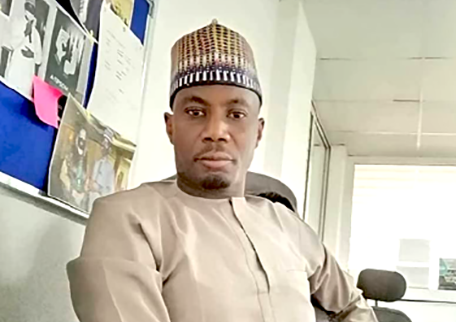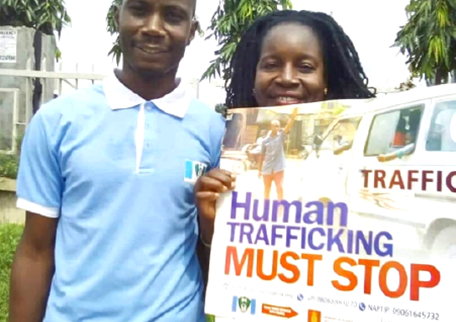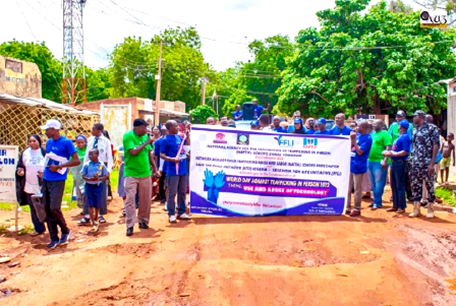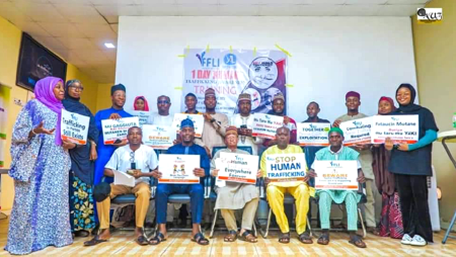Real Life Stories: People Trafficking in Nigeria (Freedom for Life Initiative)
The latest in our series of partner interviews is with Sani Dantuni Bello. Sani’s story was compiled by Liluye staff writer, Sylvia Nalubega. Sani is a Mandela Washington fellow, founder of Freedom for Life Initiative, and is passionate about combating human trafficking within Nigeria.
How did you first get involved in being part of this work? In other words, what motivated you, or still drives you, to work on the issue of trafficking? Can you share a personal story?
Growing up in Northern Nigeria, I have always been very passionate about helping children. I was particularly struck with the way Almajiri children (a category of vulnerable children in Northern Nigeria) are maltreated and left to cater for themselves under the Almajiri system of education, a practice that is prevalent in Northern Nigeria, Niger Republic, and Senegal where parents send their children, mostly boys aged 4-12, to distant locations to acquire Qur’anic education. Many rural and poor families who can’t afford formal schooling make this choice. It is difficult to know the number of Almajiri children in Nigeria, but some estimates put it at about 10 million, or about 81% of the more than 10 million, out-of-school children in the country. Since then, I have vowed to dedicate my life towards the protection of children. It was with this vow in mind that I was given the opportunity to work in different areas combating human trafficking with the National Agency for the Prohibition of Trafficking in Persons (NAPTIP) for over 14 years.
During this period, I was able to facilitate the rescue and return of more than 200 victims of human trafficking along the Nigeria and Niger Republic border. Following my participation in the 2014 Mandela Washington Fellowship, I founded a non-profit, the Freedom for Life Initiative, dedicated to breaking the barriers of women and children who are exploited. Currently, I serve as the Technical Advisor to the European Union Action against Trafficking in Persons and Smuggling of Migrants project in Nigeria.
What are the specific mission and goals of your organization?
The Freedom for Life Initiative envisions a society devoid of human degradation and exploitation, where children and young people will have the opportunity to realize their full potential through education and healthcare. We are a non-profit organization dedicated to breaking the exploitation of women and children.
What is the severity of human and sex trafficking in your area?
Northern Nigeria is a source, transit, and destination for human trafficking. In addition to being a major route for trafficking of women and children from the Southern part of Nigeria to Europe via the Maghreb; conflict, particularly the Boko Haram insurgency and banditry, has made the region a hub for trafficking, making it a difficult task to combat. Similarly, thousands of Nigerian women and children are trafficked out of the region, mainly to the Middle East. Most of these women and girls end up as sex workers, domestic workers, or enmeshed in modern slavery, which often includes extreme violence and forced labor.
What are the long-term implications of human trafficking, especially on women and girls?
The implication includes the gross violation and infringement upon women’s rights and dignity, an increase in exposure to sexually transmitted diseases, and psychological and physical abuses. This also limits their ability to meaningfully participate in development processes such as going to school and making meaningful contributions in their communities.
Share with us some of the things you are doing to support survivors of trafficking, or to prevent those who are vulnerable from going through it?
Our approach is based on raising awareness of vulnerable communities, as well as the identification and provision of emergency support to survivors. Our support includes food, clothing, and access to medical services and counseling. We also do capacity building of relevant stakeholders, including social workers, police officers, and other NGO workers on child protection to identify, offer protection, and rehabilitate survivors. Our activities have impacted over 5,000 people since our inception in 2015.
What kind of change do you want to see as a result of your work among the survivors of trafficking, or those who are most vulnerable to it?
I want to see communities and people more informed about human trafficking and the different tactics traffickers deploy to recruit victims. I also want to see increased and timely access to justice, including having access to free legal services and protection to survivors. I believe the first step towards ending human trafficking is keeping people informed.
Is there anything else you would like to add?
Collaboration and synergies amongst all stakeholders will go a long way to winning the fight against trafficking. If criminals across borders can collaborate to perpetuate trafficking, I see no reason why we shouldn’t collaborate to end it.
“Our activities have impacted over 5,000 people since our inception in 2015.”
What kind of support do you need for your work and where are you located?
Specifically, we want paralegal capacity building to enable us to provide survivors with a range of options to access justice. In addition, I want to develop regional and global networks and collaborations for civil action against traffickers.
To contact the Freedom for Life Initiative:
Phone: +2348036844380 or +2348093005555
Email: dteegus@gmail.com or freedom.forlifeinitiative@gmail.com
To find out more about the Freedom for Life Initiative:
Visit Freedom for Life Initiative on the web: Freedom for Life Initiative
Visit Freedom for Life Initiative on Facebook: Freedom for Life Initiative
Visit Freedom for Life Initiative on LinkedIn: Freedom for Life Initiative
Visit Freedom for Life Initiative on Twitter: Freedom for Life Iniative
For more information about Liluye or to inquire about becoming a partner, please visit: www.liluye.org/contact. Or, if you are interested in donating to Liluye, please visit: www.liluye.org/donate.
Sani was interviewed by Liluye staff writer, Sylvia Nalubega, who also writes on her blog, Sanyu Centre for Arts and Rights. Sylvia’s personal message to everyone is, “We live beyond ourselves by sharing our story to hopefully impact a person.”





